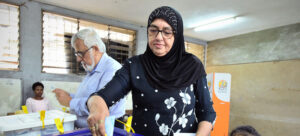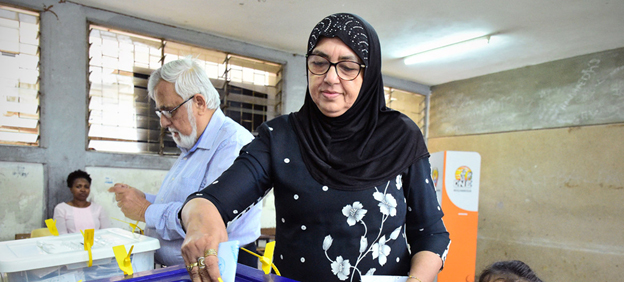
Civil Society, Democracy, Global, Headlines, Human Rights, TerraViva United Nations

A woman, accompanied by a child, casts her vote during the general elections in Mozambique. Credit: UNDP/Rochan Kadariya
– These days there hasn’t been certainly a shortage of reports portraying the decline of liberal democracy around the world.
With rising popularism and a divisive use of social media, we should not be surprised about a general malaise taking roots in most advanced liberal democracies.
From the Freedom in the World 2021 report published by the Freedom House to the Democracy Index 2020 released by the Economist Intelligence Unit to the IDEA’s Global State of Democracy Indices there is more and more evidence that liberal and representatives’ democracies are under duress.
Could the ongoing debate about a New Social Contract, a concept launched by UN Secretary General Antonio Guterres, help revive one of the essential elements of any democratic society, people’s interest and participation in the civic life?
If his recent re-election at the helm of the United Nations might have dissipated doubts that this new idea was just a fad, what are the chances for this debate surrounding the New Social Contract to become an opportunity to enhance public engagement at local levels without further dividing the gulf between classic liberal democracies on one side and other nations adopting less democratic, more authoritarian political systems?
Provocatively, could such debate instead help nearing such the gap?
To set aside any doubts, inevitably, the New Social Contract is not about enhancing democracy around the world.
This would clearly a utopian proposition for the Secretary General to embrace but rather an attempt to rethink and improve, regardless of the political system being adopted, the norms between citizens and the state.
Initially coined during the 18th Nelson Mandela Annual Lecture in 2020, Guterres made the case for a more just and inclusive society centered around the fights against inequalities and discriminations because, he said, “People want social and economic systems that work for everyone”.

Members of the Madheshi community of Biratnagar attend a political rally to demand autonomous federal regions and greater representation in parliament. Credit: UN Photo/Agnieszka Mikulska
“The New Social Contract, between Governments, people, civil society, business and more, must integrate employment, sustainable development and social protection, based on equal rights and opportunities for all”.
As vague as it is in terms of boundaries and ultimate goals, the New Social Contract can be seen as a framework that can, not only revitalize our societies but also build a fairer, cleaner and just economy able to overcome the multiple challenges created by the pandemic.
The Agenda 2030 and the Sustainable Development Goals attached to it, offer the blueprint upon which such idea can be built locally.
Being still a working in progress, the New Social Contract can offer an impetus not only at re-designing the relationships between social partners, governments, unions and businesses but it can also be a source to generate more interest among the population about public life.
Making sense of it especially from the perspective of youth can be challenging but it is essential doing so because we cannot imagine a renewed citizenry without including youth whose vast majorities are uninterested and disenchanted from the public discourse.
A possible pathway to generate new passions for civic life among youth would start from helping them being more informed about what is happening at local and national levels, something that can evolve to higher forms of deep interests.
The last stage of this continuum would be supporting them into embracing forms of direct engagement.
Engagement is driven by a strong interest for the public life and the willingness to turn such desire to know more into contributions, actions on the grounds.
Last year, UNV came up with a new volunteering framework that fully captures the different features and characteristics of giving your time, energies and skills for the public good.
Indeed, volunteerism with its different forms and dimensions, is one of the best tools to involve people and youth in particular in the public life.
That’s why it is not surprising that the upcoming UNV’s State of the World’s Volunteerism Report, is going to explain how volunteerism can be a true enabler for determinant for the New Social Contract.
More opportunities for public engagement will also generate more trust, an essential trait of any healthy and cohesive society and it is here where the ongoing efforts to localize the SDGs can make the difference by bringing people together for the common good, for achieving the goals at grassroots levels.
Achieving the SDGs at this level is not about just actions, about mobilization of resources of human, in kinds or financial nature. It is also about deliberation and here, after this long detour, I am reconnecting with the issue of democracy.
The design of a New Social Contract as a conducive platform to achieve the SDGs locally by involving people on the ground, can be a tool to elevate the quality of democratic discourse, generating platforms for a new form of shared decision making or shared governance.
Interestingly, while political parties wherever they operate, might become a hindrance to such change because their role as gatekeeper of public participation would be eroded, this conceptualization of shared governance might become of interest to nations not adhering to representative, parties dominated liberal systems.
In the field of political science there is a dynamic movement of social scientists exploring the concept of deliberative democracy that would allow, through different means, including sortition, to have new forms of real, rather than token, forms of public involvement and participation in the decision making.
It’s true that so far, most of the attempts putting in practice deliberative democracy have been applied in the contexts with solid liberal democratic traditions.
A diverse range of “experiments” have been carried out with the most successful probably being the Ostbelgien Modell adapted by the Parliament of the German-speaking Community of Belgium where there is a permanent Citizens’ Council that enable an ecosystem of Citizen’s Assemblies.
Ireland in the past used successfully some aspects of deliberative democracy to involve the general public in discussing and debating key constitutional issues that also helped generating consensus on gay marriage gender equality.
This legacy continues with a Citizens’ Assembly that recently submitted a report, after prolonged consultations and deliberations, on the issue of gender equality.
Iceland has been using a hybrid form of public deliberation, though led by a small number of elected citizens but with ample opportunities for people to crowdsource the nation’s constitution.
Other forms, with vary degree of success and with different level of inclusivity and decision-making power, were tried in two provinces of Canada, British Columbia and Ontario.
Within the growing area of deliberative democracy studies, there is now a great interest on the so-called “deliberative micro public” where a limited number of citizens gather to decide on certain issues of common interest.
If you have seen The Best of Enemies, a movie portraying an exercise of public deliberation about segregated learning in the Jim Crow’s United States in the early seventies, you get the idea about what these might look like.
Many of these lessons learned might also be of interest to policy makers whose political systems have not embraced democracy.
With the discussions still going on how the New Social Contract should look like at local levels and with the agenda of SDGs localization being recognized as instrumental to achieve the Agenda 2030, we could have an opportunity to advance stronger forms of public participation in the decision making locally and everywhere.
This would strengthen the meaning of good governance around the world while also creating new space for deliberations in contexts that normally shut them.
Perhaps deliberative participation, a term that might be easier to sell globally, if properly carried out at local levels, could become a cornerstone of the New Social Contract, reinvigorating classic democracy where already exists while creating space for others political systems to evolve and be more inclusive.
The Author, is the Co-Founder of ENGAGE, a not for profit in Nepal. He writes on volunteerism, social inclusion, youth development and regional integration as an engine to improve people’s lives.
